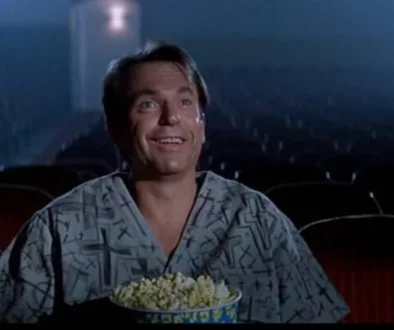31
John offers the Doctor some sugar for his tea. John is a black man with a Caribbean accent.
“Ah,” says the Doctor ruminatively, regarding his sugarless tea, “A decision. Would it make any difference?”
“It would make your tea sweet,” says John, humouring this strange customer.
“Yes, but beyond the confines of my tastebuds, would it make any difference?”
“Not really.”
“But…”
John is suddenly strangely interested. “Yeah?” he prompts, wanting to hear more. (I used to think of John as a manifestation of the ‘magical negro‘ stereotype… but actually he’s just an ordinary Londoner who meets a magical Scotsman. As such he’s one of the better examples of the Cartmel era representing black people. Sadly, those years often saw black men cast simply because the character was a rapper or a blues musician.)
“What if I could control people’s tastebuds?” suggests the Doctor, “What if I decided that no one would take sugar? That’d make a difference to those who sell the sugar and those who cut the cane.”
One person making a little decision doesn’t change much. Lots and lots of people making lots and lots of little decisions, however…
“My father, he was a cane cutter,” says John.
“Exactly. Now, if no one had used sugar, your father wouldn’t have been a cane cutter, would he?”
“If this sugar thing had never started,” says John, “my great-grandfather wouldn’t have been kidnapped, chained up, and sold in Kingston in the first place. I’d be a African.”
In British Jamaica, as in Brazil and French San Domingue, slavery was at its most brutal. Slaves were literally worked to death. The horrors of Caribbean slavery – virtually unrepresented by the mainstream capitalist culture industries – equal anything seen in the Nazi camps (which are endlessly dramatized and documented in popular culture as a warning against ideological extremism and a foil for the moral courage of the British and the Americans). The connection between these horrors – that both were caused by capitalist empires grabbing land and profiting from racialised slavery – is still less often made.
John is lucky to exist at all. For a long period, death rates for slaves in Jamaica were considerably higher than birth rates.
Slavery is not only one of the foundations of capitalism, funding and propping it up in the lands of the free, but it is also the origin of modern racism. ‘Race’ is a fundamentally unreal concept when it comes to humans; a social construct… and a relatively recent one in its current form. ‘Races’ were made socially. It was, for instance, far from clear to the dominant ‘Anglo-Saxon’ culture in 18th-19th Century America that the Irish or the Poles were ‘white’. The idea that ‘negroes’ were an inferior ‘race’ arose with the need for millions of people who could be used as farm machinery in the plantations of the ‘New World’. It was a get-out clause against the universalising promises of the bourgeois revolutions. The American Declaration of Independence stated “all men are created equal”. There needed to be footnotes to that so that the gentelmen who wrote and signed it could keep their wealth and privilege. But it was only with the rise of a new society that such footnotes become necessary. The Tsars never had to justify why some were serfs and some were not: that was just the way of the world. Skin-colour was a handy marker for the modern, bourgeois Tsars; the Tsars of Liberty. It was a justification. It divided some workers from others. It was an unremovable mark. Pigment became a serial number. The toxic effects of this still deform the world.
It’s quite rare to see any connection made in popular culture between racism (which is what this story – with its racially warring Daleks and its ‘No Coloureds’ signs and its little group of British fascists – is about) and slavery. Still more rare to see slavery and racism talked about – even obliquely – as direct results of market forces. In this scene, slavery is something you consume. Do you want some slavery in your tea? Of course, there is also the question of where the tea comes from.
John doubtless gets stick from some white Londoners for being an immigrant, but he’s descended from people who were given no choice but to be ‘immigrants’ to Jamaica. He probably came here to fill one of those situations vacant that Britain had after the war. As before, there was work that Whitey needed doing.
This scene is happening in November 1963. The previous year, the Conservative government passed the Commonwealth Immigrants Act, restricting the right of Commonwealth people to move to Britain. Leader of the Opposition High Gaitskill called this “cruel and brutal anti-colour legislation”. The following year, amidst a Labour General Election victory, the Tories ran a successful campaign in Smethwick for Peter Griffiths featuring the slogan (if you’ll pardon my repeating it): “If you want a nigger for a neighbour, vote Liberal or Labour”. Harold Wilson called for Griffiths to be treated as an untouchable in Parliament. Of course, by 1968, Wilson’s Labour government was introducing (with Tory support) a new Act which further restricted the right of Commonwealth citizens to move to Britain. That’s just what Labour does: talk the talk of moral outrage when in opposition, then out-racist the racists once in power.
Boulders. Lakes. Ripples.


May 27, 2016 @ 6:18 pm
games like clash royale are lot of fun if you have a gaming console like your android phone or ios device, these games includes games like clash royale which are really bringing a lot of gems in my life.
September 6, 2016 @ 3:49 pm
Certains coups de gueule ont été entendus, d’autres par contre n’ont visiblement pas convaincu l’éditeur. En premier lieu le géant royal qui est certainement la carte plus décriée. Avec une légère baisse de sa vitesse d’attaque, la carte a reçu un nerf mérité mais qui lui permet d’être encore dévastatrice.